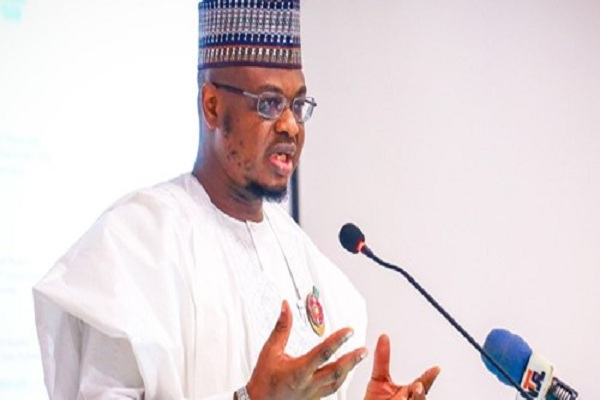Telecom
Broadband: Pantami, Danbatta Assure of FG’s Plans to Bridge Infrastructure Deficit

The Nigerian government has reassured of its commitment to ensure pervasive and ubiquitous broadband penetration in the country.

Therefore, the ongoing policy directions and regulatory measures being put in place by the Nigerian Government towards bridging identified broadband infrastructure gaps shall be sustained in order to facilitate increased access to the Internet by citizens across the country.
Prof. Isa Ali Ibrahim Pantami, Minister of Communications and Digital Economy, and Prof. Umar Garba Danbatta, Executive Vice Chairman of the Nigerian Communications Commission (NCC), gave the assurance in their presentations during the recently-concluded virtual African Internet Governance Forum 2021 (vAFIGF2021).
The three-day annual forum which held in-person and virtually, was organised with the theme: “Advancing Digital Transformation in Africa in the Face of Crisis”, and hosted by the Nigerian government.
The forum was attended by many stakeholders within the African Information and Communication Technology (ICT) ecosystem.
Pantami, who was represented at the forum by a Director at NCC, who doubles as Adviser to the Minister on Technical Matters, Prof. Sahalu Balarabe Junaidu, said the objective of the forum was to harness digital technology and innovation, transform societies and economies, and eradicate poverty for social and economic development in the Continent.
The Minister said, with the challenges thrown up by the outbreak of COVID-19 pandemic, the demand for Internet services has increased dramatically. He called on African citizens to access the broadband/internet services to carry out their personal and official task more effectively and effectively.
“The COVID-19 pandemic has accelerated the increased need to embrace the digital culture. So, as Africans, one of the ways by which we can respond to the challenge thrown by the pandemic is to accelerate our digital transformation,” he said.
Pantami explained that the digital transformation strategy for Africa should be established on key foundational pillars which include an enabling environment, policy regulation, digital infrastructure, digital skills and human capacity, as well as digital innovation, and entrepreneurship.
He said critical sectors such as digital trade and financial services, digital government, digital education, digital health, and digital agriculture, are also underlining pillars of the transformation.
Additionally, he said the drivers of digital transformation include digital content and applications, digital identification, emerging technology, cyber security, privacy and personal data protection, as well as research and development.
Pantami recalled that Internet usage in sub-Saharan Africa is still not encouraging, according to report by the International Finance Corporation ( IFC ) and World Bank.
However, the Minister asserted that Nigeria, with its current over 140 million Internet users, has one of the largest subscriptions in the sub-region.
The Minister said the various policies, including the National Digital Economy Policy and Strategy (2020-2030), and the Nigerian National Broadband Plan (NNBP) 2020-2025, emplaced to address infrastructure challenges and enhance the country’s migration to a more robust digital economy, will also ensure that more citizens are able to have access to the Internet in the coming years.
He mentioned the recent successful auction of 3.5 gigahertz (GHz) spectrum band for the scheduled deployment of Fifth Generation (5G) networks as another important policy and strategic step taken by the Nigerian government to boost broadband penetration in the country.
Pantami also listed the enforcement and implementation of the National Cyber Security Policy and Strategy 2021, and the review of the Cybercrimes Act of 2015 to build an inclusive Internet governance ecosystem and boost digital cooperation, as well as the ongoing linking of citizens National identification Number (NINs) with the Subscriber Identification Module (SIM) as worthy state actions that will yield great benefits.
Other initiatives cited by the Minister include the ongoing effort to address high Right of Way (RoW) charges, tackling multiple taxation in the ecosystem, and increasing stakeholder collaboration.
Meanwhile, the Director, New Media and Information Security, NCC, Dr. Al-Hassan Haru, who represented Danbatta at the forum, reiterated the Commission’s commitment to ensuring broadband penetration through stimulating continuous roll-out of broadband infrastructure.
He said the Commission is well positioned to drive government policy direction to tackle digital infrastructure deficit in the telecoms sector, as well as to explore necessary options to improve the nation’s digital ecosystem.
“The future is digital, and we should be committed to supporting and collaborating with African countries to maximise opportunities inherent in digital technologies. We should also be ready to avoid the pitfalls by instituting appropriate regulations as we are doing in NCC,” he added.
Other stakeholders at the event included eminent policy experts, leading technology managers from the private sector, representatives of governmental organisations, civil society organisations, non-governmental organisations, the academia, and Internet end-users, who actively participated in the discourses during the three-day forum.
Telecom
Mafab Communications Has Launched 5G Services- Findings

Contrary to media some media reports yesterday, Mafab Communications, one of the companies granted Fifth Generation (5G) licences by Nigerian Communications Commission (NCC) has actually rolled out its 5G network services in Abuja since 2023.

According to Nigeria CommunicationsWeek findings, the rollout came almost a year since the telco paid $273.6 million for spectrum in the 3.5GHz band as part of a government auction.
Mafab Communications, has, not however kept to its promise to to strengthen its commercial operations by March 2025 as its services has remained skeletal since the media launch.
It said that it will roll out its high-speed 5G services through 102 operational sites strategically located in Kano and Abuja but that did not happen as at close of March.
An insider in the company, however assured that starting this month, subscribers with Mafab’s 5G routers will be able to enjoy ultra-fast connectivity on its expanding network.
This move aims to capture a wider share of Nigeria’s growing demand for 5G services.
Dr Musbahu Bashir, founder and chairman, Mafab Communications, said during the rollout launch that the telco will offer both voice and data services nationwide.
Additionally, Nigerian cities like Lagos, Port Harcourt, Enugu, Kano, and Kaduna have been listed for the deployment of 5G services while those not on the list will have services deployed at a later stage.
“The rollout of Mafab Communications 5G network is the beginning of immense opportunities for the country as it represents Nigeria’s capabilities and infinite possibilities,” he said.
“The prospect of increased job opportunities as a consequence of the value-chain benefits the technology will generate and offer is the dream we have all gathered here to launch today,” Bashir continued.
Telecom
Samsung Introduces Local Nigerian Languages to Galaxy Devices, Celebrating Cultural Diversity

Samsung Electronics has taken a bold step in enhancing user experience and inclusivity by introducing Hausa, Igbo, and Yoruba as official language options on selected Samsung Galaxy devices.

L-R: Stephen Okwara, Head, Product Management, Mobile Experience, Samsung Electronics West Africa; Joy Tim-Ayoola, Group Head, Mobile Experience, Samsung Electronics West Africa; Tae Sun Lee, Samsung Electronics West Africa CEO; Oge Maduagwu, Head of Marketing Samsung Electronics West Africa, and Nathan Lee, Regional Business Lead, Mobile Experience, Samsung Electronics West Africa, at the launch of Nigeria local language integration on Galaxy S25, A56, A36, and A26 devices, on April 03, 2025.
The feature, which is now available on the Galaxy S25, A56, A36, and A26 devices, reaffirms Samsung’s commitment to delivering innovative technology that speaks the language of its users.
With this groundbreaking update, Samsung users across Nigeria can now navigate their smartphones in their preferred local language, making technology more accessible, while also upholding our cultural heritage.
A Celebration of Culture and Technology
To mark the launch, Samsung hosted a cultural-themed press briefing featuring traditional music, local cuisine, and a showcase of the new language feature. Employees and guests attended in traditional Yoruba, Igbo, and Hausa attires, celebrating Nigeria’s rich cultural diversity.
Samsung also announced plans to expand local language support to more devices in the near future, reinforcing its dedication to making technology more inclusive for African users.
Empowering Users Through Language
The integration of Hausa, Igbo and Yoruba on Samsung devices reflects the brand’s mission to bridge the digital gap and enhance user engagement. Speaking at the press conference, Oge Maduagwu, Head of Marketing, Samsung Electronics West Africa, said, “At Samsung, we understand that technology is most powerful when it is accessible to all.
“By incorporating our local Nigerian languages, we are making our devices more intuitive and relatable, ensuring that millions of Nigerians can interact with their smartphones in the language they love and understand best”.
Seamless Language Transition on Galaxy Devices
Stephen Okwara, Head of Product Management, Samsung Electronics West Africa added, “The new local language feature is designed to deliver a seamless user experience, allowing customers to easily switch between languages. Users can activate Hausa, Igbo, or Yoruba on the Galaxy S25, A26, A36, and A56 by navigating to: Settings > Language & Input > Select Language
“This update enhances smartphone usability, particularly for those who prefer their native language over English, ensuring greater digital inclusivity, enhancing digital literacy and encouraging more users to engage with technology in their native tongues” He concluded.
Availability
Customers can visit all Samsung Experience Stores or authorized retailers in Nigeria to learn more and experience the feature firsthand.
Telecom
Sophos Reveals Key Findings: 56% of Cyberattacks Exploit Valid Credentials

Sophos, a global leader of innovative security solutions for defeating cyberattacks, has released the 2025 Sophos Active Adversary Report, which details attacker behaviour and techniques from over 400 Managed Detection and Response (MDR) and Incident Response (IR) cases in 2024.

The report found that the primary way attackers gained initial access to networks (56% of all cases across MDR and IR) was by exploiting external remote services, which includes edge devices such as firewalls and VPNs, by leveraging valid accounts.
The combination of external remote services and valid accounts aligns with the top root causes of attacks. For the second year in row, compromised credentials were the number one root cause of attacks (41% of cases). This was followed by exploited vulnerabilities (21.79%) and brute force attacks (21.07%).
Understanding The Speed of Attacks
When analyzing MDR and IR investigations, the Sophos X-Ops team looked specifically at ransomware, data exfiltration, and data extortion cases to identify how fast attackers progressed through the stages of an attack within an organization. In those three types of cases, the median time between the start of an attack and exfiltration was only 72.98 hours (3.04 days). Furthermore, there was only a median of 2.7 hours from exfiltration to attack detection.
“Passive security is no longer enough. While prevention is essential, rapid response is critical. Organizations must actively monitor networks and act swiftly against observed telemetry. Coordinated attacks by motivated adversaries require a coordinated defense. For many organizations, that means combining business-specific knowledge with expert-led detection and response. Our report confirms that organizations with proactive monitoring detect attacks faster and experience better outcomes,” said John Shier, field CISO.
Other Key Findings from the 2025 Sophos Active Adversary Report:
· Attackers Can Take Control of a System in Just 11 Hours: The median time between attackers’ initial action and their first (often successful) attempt to breach Active Directory (AD) – arguably one of the most important assets in any Windows network – was just 11 hours. If successful, attackers can more easily take control of the organization.
· Top Ransomware Groups in Sophos Cases: Akira was the most frequently encountered ransomware group in 2024, followed by Fog and LockBit (despite a multi-government takedown of LockBit earlier in the year).
· Dwell Time is Down to Just 2 Days: Overall, dwell time – the time from the start of an attack to when it is detected – decreased from 4 days to just 2 in 2024, largely due to the addition of MDR cases to the dataset.
· Dwell Time in IR Cases: Dwell time remained stable at 4 days for ransomware attacks and 11.5 days for non-ransomware cases.
· Dwell Time in MDR Cases: In MDR investigations, dwell time was only 3 days for ransomware cases and just 1 day for non-ransomware cases, suggesting MDR teams are able to more quickly detect and respond to attacks.
Ransomware Groups Work Overnight: In 2024, 83% of ransomware binaries were dropped outside of the targets’ local business hours.
· Remote Desktop Protocol Continues to Dominate: RDP was involved in 84% of MDR/IR cases, making it the most frequently abused Microsoft tool.
To shore up their defenses, Sophos recommends that companies do the following:
· Close exposed RDP ports
· Use phishing-resistant multifactor authentication (MFA) wherever possible
· Patch vulnerable systems in a timely manner, with a particular focus on internet-facing devices and services
· Deploy EDR or MDR and ensure it is proactively monitored 24/7
· Establish a comprehensive incident response plan and test it regularly through simulations or tabletop exercises
Read the full It Takes Two: The 2025 Sophos Active Adversary Report on Sophos.com.

 General News3 days ago
General News3 days agoAirbnb Community Fund Donates ₦13 Billion to Nonprofits Worldwide

 General News3 days ago
General News3 days agoNigerian Military Makes History with Africa’s First Attack Drones, Bombs

 Telecom2 days ago
Telecom2 days agoMTN Denies Data Theft Allegations, Says no Financial Incentive to Do So

 News3 days ago
News3 days agoShell, Renaissance Face Legal Action over SPDC Licence Transfer

 E-Business3 days ago
E-Business3 days agoKike, Nigerian Tech Firm Launches ‘Kike AI’ for Kitchen Innovation

 Telecom3 days ago
Telecom3 days agoNigeria Heads Anglophone Data Protection Committee

 E-Financial3 days ago
E-Financial3 days agoSterling Bank Makes Online Transfer Charges Free of Charge

 Telecom2 days ago
Telecom2 days agoVitel Wireless, Nigeria’s First MVNO to Launch Operations This Quarter






















